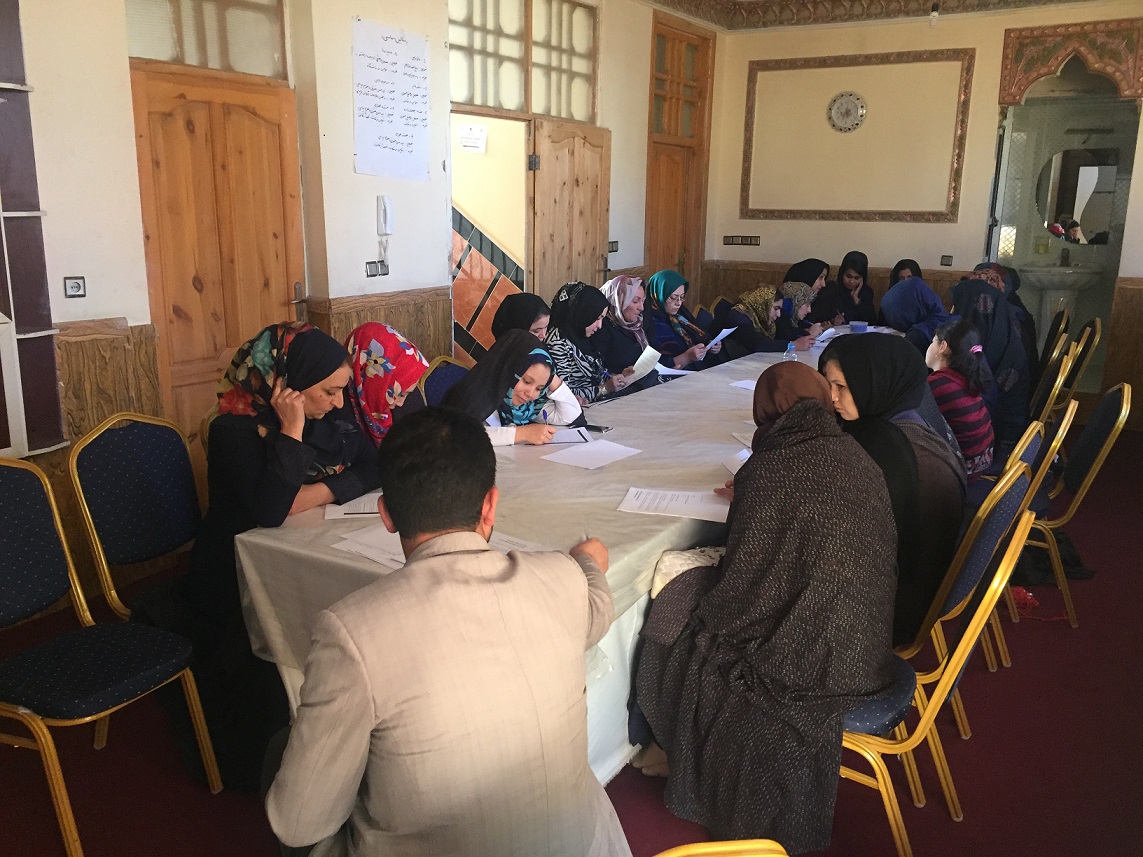 In order to build link with the women at the grass root level, it is important to develop a network between some strong, influential, and powerful women for advocacy, capacity building and awareness raising. EPD created a network of these women called Provincial Women Network in 15 provinces of Afghanistan to strengthen the role of women in social, political, development, advocacy and decision-making processes, while providing accountability and oversight into public service delivery. The PWN creates a platform that brings women from different walks of life together for training and capacity building purposes. EPD began the establishment of PWNs as early as 2013 and since then, it has been established in 15 provinces like Kabul, Herat, Bamyan, Nagarhar, Kunduz, Kandahar, Laghman, Helmand, Uruzgan, Parwan, Balkh, Daikundi, Badakhshan, Paktia and Faryab.
In order to build link with the women at the grass root level, it is important to develop a network between some strong, influential, and powerful women for advocacy, capacity building and awareness raising. EPD created a network of these women called Provincial Women Network in 15 provinces of Afghanistan to strengthen the role of women in social, political, development, advocacy and decision-making processes, while providing accountability and oversight into public service delivery. The PWN creates a platform that brings women from different walks of life together for training and capacity building purposes. EPD began the establishment of PWNs as early as 2013 and since then, it has been established in 15 provinces like Kabul, Herat, Bamyan, Nagarhar, Kunduz, Kandahar, Laghman, Helmand, Uruzgan, Parwan, Balkh, Daikundi, Badakhshan, Paktia and Faryab.
EPD will evaluate the performance of PWN in 15 provinces and will assess the change among the PWN members and other concerned stakeholders, regarding their attitudes, perceptions, and behaviors towards UNSCR 1325 goals. EPD has already conducted the first round of this evaluation in which we saw certain amazing achievements of these networks at the grass root level. In Round II also, EPD evaluated the progress and effectiveness of the 15 PWN branches from the perspective of members as well as the influential stakeholders, who support their work in achieving the goals of UNSCR 1325. This assessment report identifies opportunities for strategic and operational improvement, through recommendations proposed by the networks and stakeholders regarding, enhancing the condition of women’s peace and security at the grassroots level.
 The assessment presents the main activities that the PWN is conducting, their advocacy activities related women peace and security including activities for prevention of women from, violence Against women (VAW), protection of women, rehabilitation of women, political participation of women and capacity building. It also gives an insight into the capacity of PWN with regard to communication skills, advocacies, awareness raising and monitoring women’s peace and security at the grass root level.
The assessment presents the main activities that the PWN is conducting, their advocacy activities related women peace and security including activities for prevention of women from, violence Against women (VAW), protection of women, rehabilitation of women, political participation of women and capacity building. It also gives an insight into the capacity of PWN with regard to communication skills, advocacies, awareness raising and monitoring women’s peace and security at the grass root level.
According to the report, it is also evident that most of the networks have succeeded to build good interaction and communication with other institution and organization in order to smoothly function in the province. The PWNs successfully have conducted various trainings like (In her shoes, UNSCR1325 and Women’s Peace and Security), documentary screening, advocacies for ensuring the women’s peace and security and also have managed to involve men in their activities at grass root level. The stakeholders almost in all of the provinces appreciated the efforts of the network, even in provinces with restricted norms and culture.
The report gives an insight into the significant achievements of PWN’s as well as challenges they face while working for women peace and security at the grassroots level. Some of the major achievements of the PWNs include, provision of the scholarships, solving VAW cases, reaching out to women in prisons and shelters, promoting women’s participation in peace building and decision making and many other initiatives to support women’s peace and security. The report has also provided a list of recommendation to address the challenges that the PWN’s face, in order to implement effectively four pillars of UNSCR 1325.
For more details on EPDs second round PWN assessment report please click on the following link:
http://www.epd-afg.org/wp-content/uploads/2017/02/Provincial-Women-Network-ME-2nd-Round.pdf

